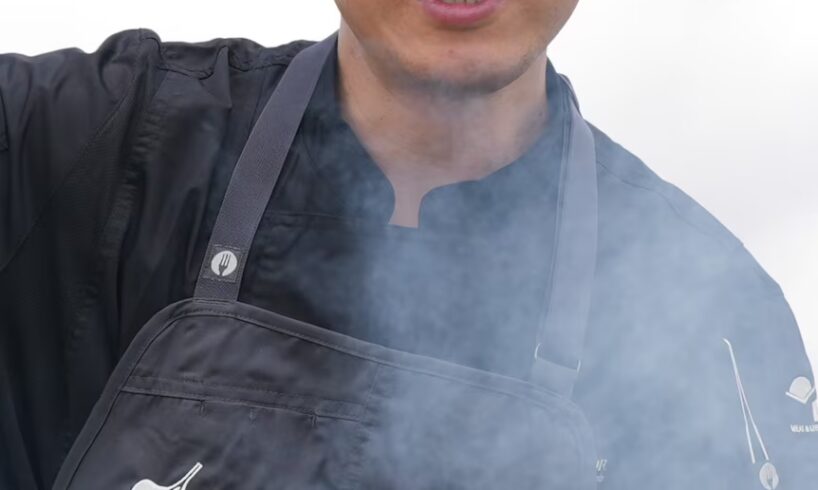
Chef Shankar Noguchi brings a rich cultural heritage to the table.
The Japanese-Indian chef travelled to Borden in Western Australia’s Great Southern region, where he joined 15 other international chefs to share his personal story and signature flavours.
Chef Shankar Noguchi travelled to Australia on a volunteer basis with 15 other chefs to learn about meat production. (ABC Great Southern: Kate Forrester)
“I’m from Tokyo, but my grandfather is from India. I cook with many, many flavours and make infusion,” Mr Noguchi said.
In return, the chef said he wanted to learn more about Australia’s paddock-to-plate journey, gaining insight into the people behind the produce.
“I cook with ingredients from Rajasthan today, and then in my team, another chef is from Korea. He cooks with his ingredients, and we combine all those flavours together with your lamb,” he said.
The chefs cooked for local producers at the WA Meat Marketing Cooperative (WAMMCO) annual general meeting. (ABC Great Southern: Rhys Jones)
Global awareness
The international visitors are part of a program called Lambassador, which was created through Meat and Livestock Australia.
This year’s delegation was the largest in the program’s history, following a one-off $3 million grant to Meat & Livestock Australia from the federal government’s Live Sheep Transition Package.
Program founder Kazu Mitsuhashi launched the initiative in Japan in 2015 with the vision to grow it into a global project.
Kazu Mitsuhashi founded the Lambassador program in Japan with the vision of building global appreciation for lamb. (ABC Great Southern: Rhys Jones)
“In Japan, there wasn’t a sheep meat eating habit, there was tiny consumption,” Mr Mitsuhashi said.
“These days, it is getting more popular now because Japanese people are looking for something new.
“There is no domestic lamb in Japan, [or] very tiny. So the majority of the sheep meat in our country is Australian lamb.”
Mr Mitsuhashi said he wanted the chefs to understand the Australian supply chain so they could share its story with consumers back home through their cooking.
Local producers had the chance to enjoy locally-grown produce, with an international twist. (ABC Great Southern: Kate Forrester)
“They’ve been visiting sheep saleyards, a processing facility, meeting producers — every part of the paddock to plate process,” he said.
But Japan is not the only country hungry for Australian-produced lamb.
Chef Lindsey Noto travelled from Alabama in the United States to cook for the 200 producers in Borden.
“There is not a lot of knowledge around lamb where I’m from, so my hope is to learn more while I’m here and then bring that back to the States,” Ms Noto said.
US chef Lindsey Noto says she is impressed by the Australian supply chain’s strong commitment to quality. (ABC Great Southern: Rhys Jones)
While visiting farms and processors in Western Australia, the American chef observed there was a greater emphasis on the overall dining experience and a strong commitment to sustainability compared to those in the United States.
“Everything is so focused on grading in the States, but here there is further investigation for the consumer,” she said.
“And isn’t that the end goal, right? Anywhere in the world, we want to serve delicious food to our customers.
“So I want to use this lamb because it’s delicious, and people want to eat delicious food.”
The chefs were divided into teams of four and competed by creating dishes for the farmers to judge. (ABC Great Southern: Kate Forrester)
Taste test
Farmers from around Western Australia’s growing regions were invited to taste and judge their homegrown produce, and hear how their lamb was being dished up on plates around the globe.
David Meyers owns a mixed-farming operation near Broomehill, 300 kilometres south of Perth, and said over the years, he had reduced his overall sheep numbers.
David Meyers says he is “moderately confident” about the future of his flock in a challenging market. (ABC Great Southern: Kate Forrester)
“For us, sheep are still a good diversification, but our numbers have decreased due to what has been happening in the sheep market,” Mr Meyers said.
“Days like this are good to see the results of the ongoing genetic investment we’ve made with our flock. Certainly it’s a big part of what we do.
“We need to make sure our enterprise is profitable and still moving forward, and these events highlight that we are heading in the right direction and supplying an exceptional product to the world.”
The local lamb was prepared in a variety of styles, showcasing a diverse range of international flavours. (ABC Great Southern: Kate Forrester)





